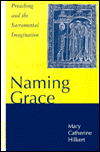
"Not only is Hilkert's work an important contribution to homiletics that will certainly be of interest to preachers from many traditions, but it is also an important contribution to narrative theory and narrative practice that will appeal to a much broader audience struggling in various ways to "hear each other into speech." The book is grounded in careful historical reflection on understandings of the power of the Word, particularly in Christian traditions, and insists that this power be understood not just rhetorically but also theologically. At every step along the way, Hilkert crosses boundaries that have been erected between "word" and "sacrament" ; between human stories and the story of Jesus; among biblical, liturgical, and doctrinal preaching. Drawing particularly on Paul Ricoeur's theory of narrative, feminist liberation theology, and political theology, as well as the theologies of Karl Rahner and Edward Schillebeeckx, Hilkert identifies preaching with "the sacramental imagination" --naming grief as well as grace a paradoxical proclamation of "God's abiding presence in a wounded world." - Steve Schroeder, Booklist
"Rarely do I get excited over required texts for graduate studies. However, a notable exception is 'Naming Grace', a wonderful contribution to liturgical preaching in the Catholic tradition. The author captured my attention from the very first page of the Introduction: 'The churches are children playing on the floor with their chemistry sets, mixing up a batch of TNT to kill a Sunday morning.' Mary Catherine Hilkert's text should be required reading for anyone brave enough to venture into the world of preaching. Since I come from a Judeo/Christian background, I am especially appreciative of Dr. Hilkert's recognition of past failures amongst homilists who preached what amounted to 'replacement theology.' From a Catholic perspective, Dr. Hilkert has words of wisdom for both the novice and seasoned homilist. Even the community has a role to play: 'For both preachers and hearers of the word this means relocating the good news not in the text but in the community in dialogue with the text'(pg. 81). Dr. Hilkert writes with a wonderful combination of wit, intelligence and sensitivity. 'Naming Grace' should be purchased by anyone serious about the art of delivering a good homily. Having read many books in the course of my M.A. and M.Div studies at St. Bernard's Institute, I was truly delighted to come across the treasure I found in 'Naming Grace'" - Raymond Grosswirth